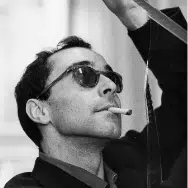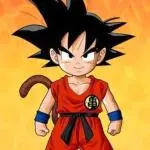At some point during Karate Kid Legends, right after Jackie Chan channels grief through a steaming teacup and just before the film turns into a TikTok AMV with kung fu, I realized something. I wasn’t watching a movie—I was watching a product. A legacy-branded content block wrapped in nostalgia gauze and corporate aspirations, a Sony-flavored parfait of identity politics, moralism, and IP reclamation.
It wants so badly to matter, but can’t stop checking itself in the mirror to see if it looks like Spider-Man.

The film opens decently, even admirably. It wastes no time establishing character, cultural displacement, and generational grief—immigration, language barriers, and a palpable tension between Chinese and American identity all find a seat at the table. There’s even a ghost of Mr. Miyagi floating through it all—offering old teachings about yin and yang, karate as balance, not violence, Japan and China as two branches of the same ancient tree. The film flirts with profundity, for a moment, there's real warmth. Real memory. It’s cinematic incense—burning faint, but fragrant. For a second, you can believe there’s soul in this.

But then the camera shifts, and Sony’s agenda steps into frame like an overeager coach who won’t shut up during practice.
Somewhere in the second act, it happens.
Someone, very deliberately, calls our young Asian lead “the Asian Peter Parker.” And that, right there, is the film’s cracked spine. It’s not a story; it’s an audition. Not for the character—for the actor, for the studio, for the brand. He’s not a hero yet, but we’re told he might be. Maybe. If we clap hard enough. If we buy in. The implication is less about character arc and more about market positioning: You will love him because we say he’s next.
But storytelling doesn’t work like that. Myth doesn't obey corporate timelines.


Where Legends shines—briefly—is in the beginning. The cultural friction, the grief of lost siblings, the collision of philosophies—these are well-tread but fertile grounds. Jackie Chan, carrying the bruised wisdom of his years, does what he can to make it feel grounded. There’s even a faint pulse of philosophical backbone: Karate it’s about restraint, honor. All that. But then the second half of the film hits, and it’s as if someone at the studio said, “Now make it digestible for eleven-year-olds on iPads.”

The tournament arc—God help me—spirals into a graphics vomit: splashes of color, pop-up text, fast cuts, actual powerpoint transitions, and music-video pacing. The screen gets so busy trying to be cool that it forgets to be coherent. The choreography isn’t bad, but you wouldn’t know it—because the camera never lingers. There’s no tension, no real pain, no sense of stakes. It’s all snips and cuts and algorithmic-injected spectacle. We’re not watching martial arts; we’re watching someone edit around them. It doesn’t feel cinematic. It feels crowdsourced. Like the ghost of an editor was possessed by TikTok. It evokes the sense that the film is no longer being directed with a human touch, but calculated—optimized for metrics, short attention spans. The cold precision of trends and engagement—has replaced the soul of storytelling, making Legends feel more like algorithm-driven content than carefully crafted cinema.



And yet the film wants to be taken seriously. It wants to teach lessons: about grief, honor, self-control, family, perseverance. But none of these are earned. They’re deployed, like corporate slogans. The villains are textbook to the point of insult—a flat-faced bully with a few half-hearted gestures toward depth, like a sad face here and there, hinted at just in time for the audience to forget he was ever an asshole. An attempted moral rebranding with no work done to justify it, nothing that earns redemption. We’re told who to root for and when to cry. Like obedient pets. Like subscribers.

 The production value screams Netflix gloss. The lighting is flat, the sets feel like sitcom dressed stages, and worst of all, the "New York" presented in the film has the texture of a theme park. The backgrounds look fake. The environments don't breathe. There is no life in this world, only rehearsal. It reeks of LED volume sets and green screen shortcuts. These things don’t bother me if they’re stylized. But here they’re just... lazy. The world feels constructed, not lived in. This isn't the city. It’s the idea of the city—rendered like a location pack from a filmmaking app.
The production value screams Netflix gloss. The lighting is flat, the sets feel like sitcom dressed stages, and worst of all, the "New York" presented in the film has the texture of a theme park. The backgrounds look fake. The environments don't breathe. There is no life in this world, only rehearsal. It reeks of LED volume sets and green screen shortcuts. These things don’t bother me if they’re stylized. But here they’re just... lazy. The world feels constructed, not lived in. This isn't the city. It’s the idea of the city—rendered like a location pack from a filmmaking app.

Let’s be honest: this isn’t Karate Kid. It’s the Nickelodeon afterschool special version, cleaned up for modern digestion, neutered of any danger or charm. It lacks the grime, the awkwardness, the heart of the originals. It doesn’t touch the ankles of the original trilogy. It doesn’t even brush against Cobra Kai’s better moments. But it is a massive improvement over the Jaden Smith reboot, which felt like someone trying to microwave leftover kung fu philosophy with no seasoning.

The original Karate Kid films had their flaws. But they bled sincerity. Legends isn’t terrible. It’s just pointless. A far cry from what it wants to be: a generational milestone, a spiritual successor, a new myth. It has its moments, sure—but they're brief. Fleeting. Ghosts of better films. It starts off like it wants to honor something, but by the end, it’s content to imitate. To sell.

It’s not a phoenix.
It’s a franchise echo, stretched and glossed over until meaning slips out the back door. I left the theater unmoved. Not angry, not offended. Just untouched. It didn’t provoke, or thrill, or stir. Like I’d watched a trailer for a movie that never actually arrived.
It was a plastic kata.
All motion, no spirit.



































View replies 1